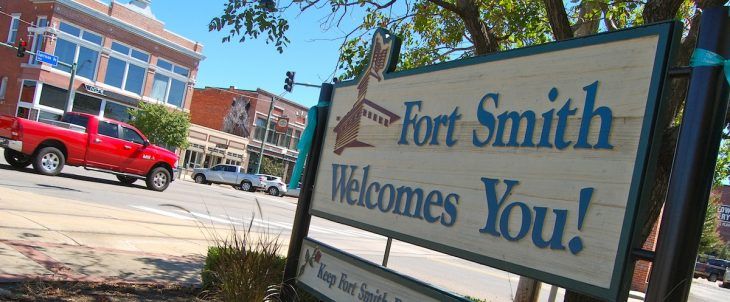$100 business license fee, franchise fee increase approved by Fort Smith board
by December 19, 2017 8:25 pm 954 views

The Fort Smith Board of Directors voted to approve a controversial $100 business license fee for the city’s close to 5,000 businesses on Tuesday night (Dec. 19) – a revenue addition that is expected to raise $471,000 annually to the city’s General Fund, 70% of which goes toward funding the city’s police and fire departments. It also placed a final punctuation mark on franchise fee rate increases expected to raise an additional $554,000 annually to the General Fund.
At the Dec. 5 meeting, city directors divided 4-3 in favor of the ordinance but due to a state statute requiring 2/3 majority in order to enact business license fees, the ordinance failed. That changed on Tuesday when Director George Catsavis, who had considered changing his vote, remained firm while Director Tracy Pennartz swung from the negative to affirmative.
Without approval, said Fort Smith Finance Director Jennifer Walker, the budget reductions would have had to come from the city’s General Fund only. Since the Board did not want step increases for police and fire and cost of living adjustments for the city’s close to 1,000 employees touched, that made the expendable new recommendations police department equipment purchases and training ($500,000); an “unfreezing” of 13 new police officers ($695,000); new personnel paid for through the General Fund ($135,000); and the fleet leasing program ($1.013 million, $600,000 paid through the General Fund).
Catsavis explained his vote, noting the consensus among most business owners he had spoken to was “We want to support this, but we want to make sure the money is going to police.” He also looked at it as a “temporary” thing until the city’s financial house was in order, stating he would be willing to remove the fee should the city find another dedicated funding stream.
Director Kevin Settle, who opposed the fee increase, said that in government, “Nothing is temporary.” Settle also pointed out there was “nothing in this ordinance today that prevents future Boards from using this for other purposes” other than the police department. Settle also warned that voters previously had been “sold” a sales and use tax based in part on removal of the city’s business license fee and that the Board was endangering a $16 million per year revenue stream for streets, bridges, and drainage in 2021, based on a perceived gain of $471,000.
Fort Smith Regional Chamber of Commerce President and CEO Tim Allen told Talk Business & Politics ahead of the vote that the Chamber “opposed the business license fee two years ago when it was being discussed, and we are not supporting it now. If the City Board of Directors chooses to impose a license fee now, it should be at minimum rate.”
Fort Smith Mayor Sandy Sanders, speaking ahead of the business license and franchise fee votes, cautioned directors that “If you total up the income these two funds would provide, that is still less than the needs for police. It will take both business license and franchise fees, and it still wouldn’t cover all the police needs. We’ve adopted the budget. In order to fund that, it will take both of these.”
The franchise fee passed along the same 4-3 line it did on Dec. 5, moving past its third reading while the emergency clause failed, needing a 2/3 majority. That means any rate increase will have to wait 30 days before enactment. The rate increase will be 0.25% for all utilities but cable, which will be an increase of 0.75%. The rates are now at the maximum allowable amount according to state statute, which also allows affected companies to pass along the full amount of increases to their customers.
Fort Smith’s year-to-date revenue from franchise fees currently totals $4.967 million, a 15.48% drop when compared to $5.877 million during the same period of 2016. The fees — collected from utilities companies like AT&T, OG&E, AOG, and Cox Cable — is in the midst of a three-year losing streak when comparing 2015, 2016, and 2017. In 2015, the $6.388 million posted was a 5.77% drop from 2014’s $6.78 million. The 2016 figure went down an additional 8%.
However, Walker noted, fees at the end of November are actually just 6% below budget due to timing of fourth quarter payments, and she expects they will finish the year at or above the budgeted amount.
